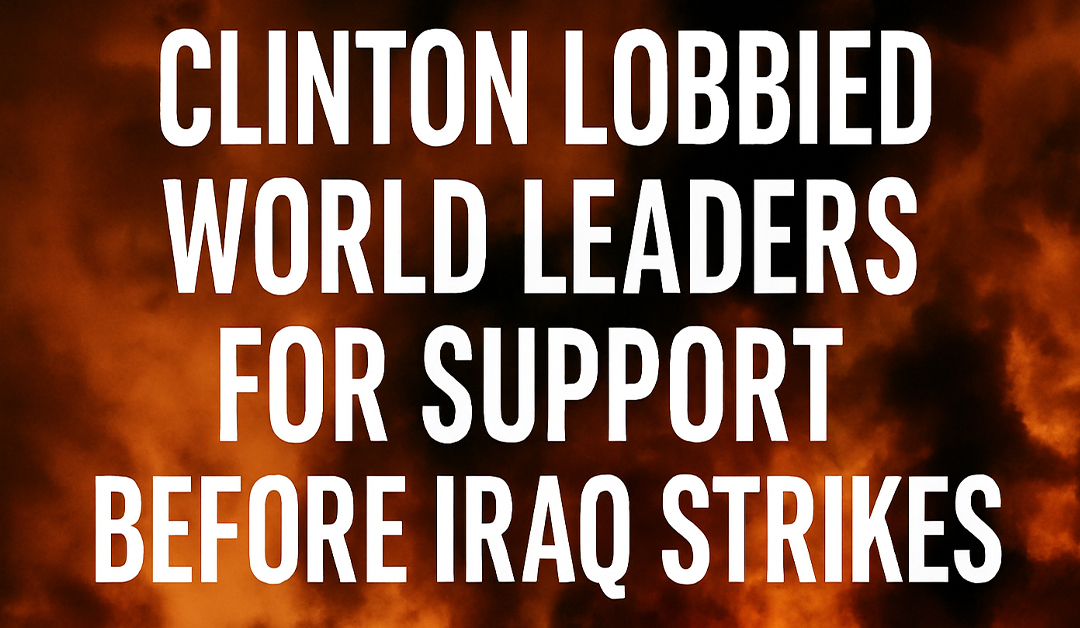A trove of declassified documents from the Clinton Presidential Library reveals the pressure-cooker diplomacy behind the U.S. airstrikes on Iraq in December 1998 - including a series of urgent calls to world leaders seeking buy-in for a “decisive” military response to Saddam Hussein’s defiance of weapons inspections.
The records, marked “CONFIDENTIAL” and “SECRET,” show President Clinton’s personal engagement with Saudi Crown Prince Abdullah, French President Jacques Chirac, and Russian President Boris Yeltsin as he built a fragile coalition in the face of Iraqi obstruction of UN weapons inspectors.
“It is clear now that Saddam really wants to force the Council to lift sanctions without giving up his WMD and missile programs,” Clinton told Chirac, adding, “There must be a strong response, or the credibility of the Security Council will be damaged.”
📞 A Coalition Under Pressure
By late 1998, Iraq had ceased cooperation with UNSCOM, the UN’s special commission on weapons inspections. Internal U.S. memos make clear that military action was already in motion when President Clinton called world leaders on short notice.
The goal: secure regional and international support for Operation Desert Fox, a four-day bombing campaign targeting Iraq’s weapons programs and military infrastructure.
“Our strike will be significant… to degrade his ability to threaten his neighbors, and it will weaken his regime,” Clinton told Crown Prince Abdullah. “I hope you will communicate to your GCC partners your support of our action.”
🤝 Behind the Curtain: Saudi Arabia, France, and Russia
The documents reveal mixed reactions from U.S. allies.
🇸🇦 Saudi Arabia
Crown Prince Abdullah, despite concerns about regional backlash, ultimately offered tacit support for the strikes. He asked Clinton how long the campaign would last. Clinton’s reply: “We expect to finish in a couple of days, before Ramadan.”
🇫🇷 France
Chirac was more skeptical. He warned that Saddam was intentionally provoking a strike to play the victim and regain sympathy in the Arab world.
“He wants to regain control of his own people, and look like a martyr,” Chirac told Clinton. “If there is a military strike, he’ll be able to go about his business as calmly as he likes.”
🇷🇺 Russia
Russia, too, was deeply uneasy. Yeltsin pleaded for restraint but later accepted the U.S. decision as inevitable. Still, the documents show repeated U.S. assurances that the use of force was a last resort - and that Saddam bore sole responsibility for the crisis.
“Too many times before, Saddam Hussein has made commitments when threatened by force only to turn around and violate them,” Clinton wrote in a letter to Yeltsin. “Ultimately, he alone will determine whether this situation is resolved peacefully.”
💣 The Decision to Strike
Despite diplomatic hesitation, Clinton moved forward. Internal briefings describe the administration’s frustration with Saddam’s “repeated failure to comply” and a belief that without action, the UN Security Council would be rendered irrelevant.
A memo to National Security Advisor Sandy Berger warned: “We risk making the Council irrelevant and emboldening Saddam to further challenge the sanctions regime.”
The strikes began on December 16, 1998.

